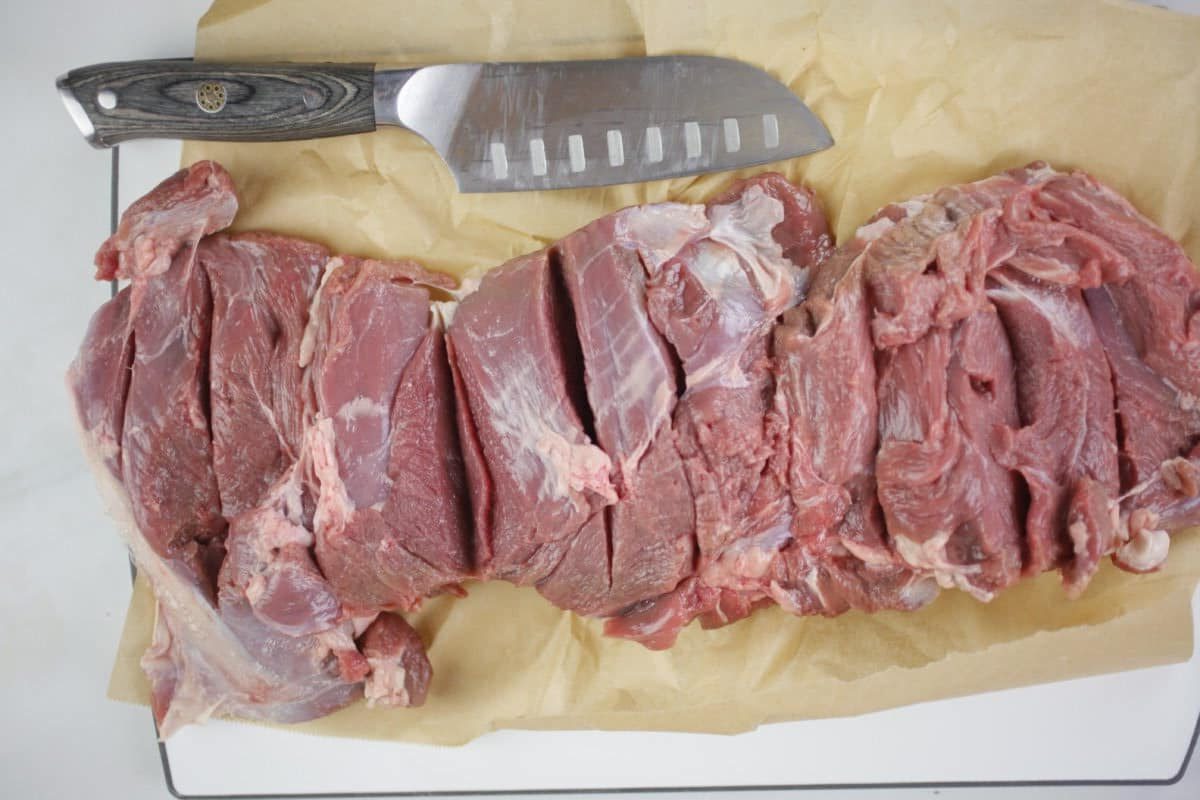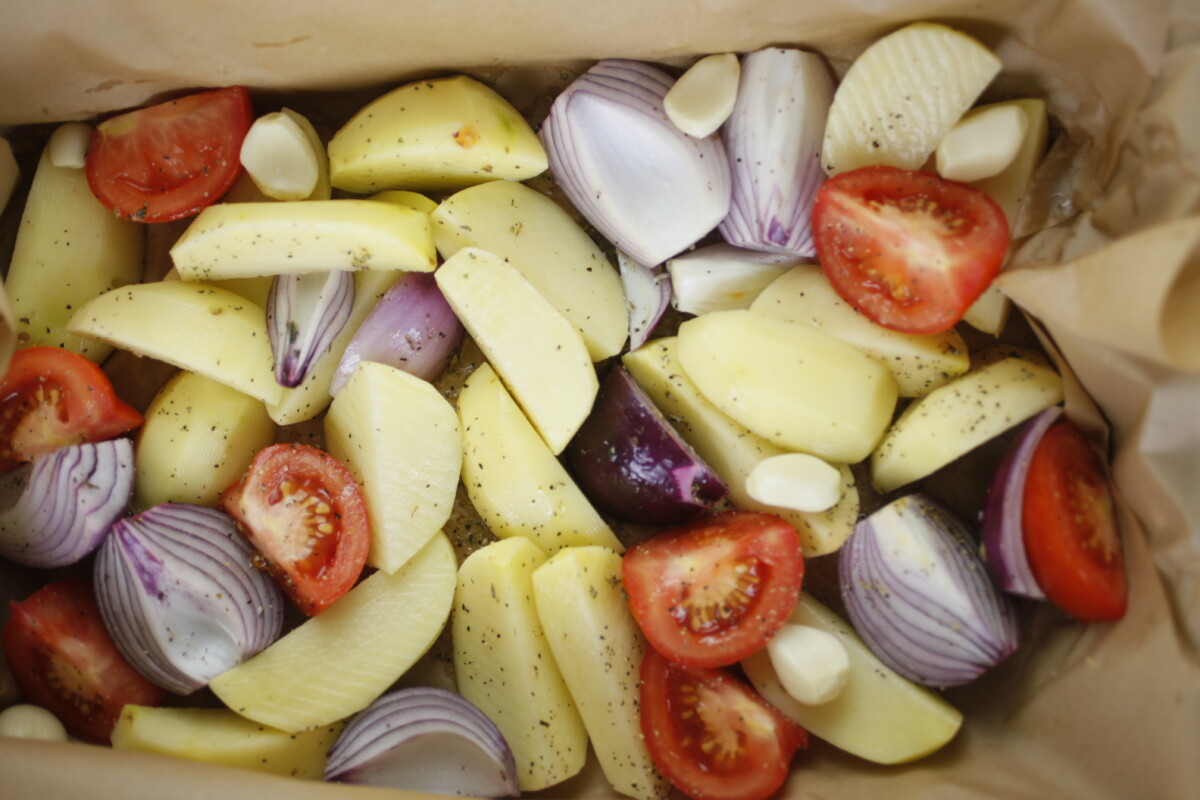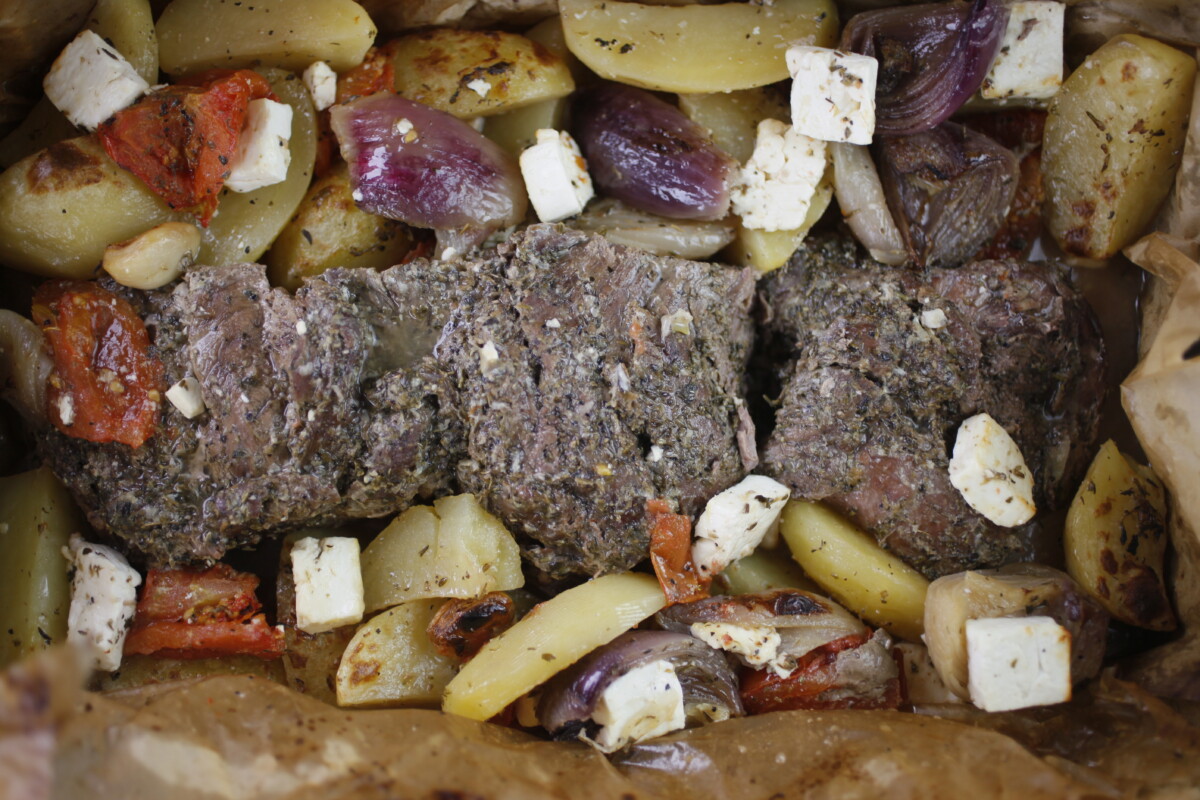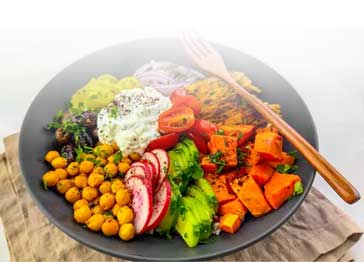Fall-apart leg of lamb, tender and infused with garlic and herbs, paired with veggies and creamy feta. It’s the kind of dish that impresses without the stress—perfect for gatherings, holidays, or feeding a hungry crowd.
Kleftiko is the Greek lamb recipe you’ll want to bring out for special gatherings and holiday feasts. Traditionally slow-cooked with lemon, garlic, and herbs, this one-pot dish transforms a boneless leg of lamb into a tender, flavor-packed centerpiece. It’s simple to prepare, easy to love, and perfect for Easter or any family occasion where you want to impress with minimal effort.
What is Kleftiko?
Kleftiko means “stolen” in Greek—a nod to its legendary roots. During Ottoman rule, Greek rebels (klephts) would secretly cook stolen lamb in underground ovens to avoid detection. The result? A slow-cooked, fall-apart lamb dish infused with lemon, garlic, and oregano. Today, Kleftiko is a flavorful tribute to Greece’s history and culinary ingenuity. It’s not just a meal—it’s a taste of tradition, perfect for special occasions or when you’re craving something boldly Mediterranean
Ingredients for your Lamb Kleftiko Recipe?
- Boneless Leg of Lamb: About 4 lbs. Trimmed excess fat, cleaned, and dried for optimal preparation.
- Potatoes: Preferably Yukon Gold, peeled and cut into chunky halves lengthwise. This variety adds a buttery texture, but any potatoes will work.
- Red Onions: Cut into large pieces for a sweet flavor profile. Red onions are preferred for their natural sweetness, but sweet potatoes can be a tasty alternative.
- Tomatoes: Ripened and Cut into large wedges to release their natural juices, enhancing the dish’s overall flavor.
- Cloves Garlic: lots of it. Mince 10 cloves and add them to the marinade for an intense flavor. Keep 5 cloves whole to infuse the remaining vegetables.
- Dry Oregano (Greek): Greek oregano adds a distinct and robust flavor. It may seem like a generous amount, but it contributes significantly to the dish’s overall taste.
- Dry Marjoram or Thyme: Adds depth and complexity to the flavor profile. Choose marjoram for a slightly sweet and floral note or thyme for a more earthy taste.
- Olive Oil: Use good-quality olive oil to moisten the lamb and help the oregano and marjoram adhere to the meat.
- Red Wine Vinegar Adds a subtle acidity, complementing the flavors and assisting in tenderizing the meat.
- Lemons: Adjust to taste. The lemon juice contributes acidity and flavor and helps tenderize the lamb.
- Feta Cheese: Cut into large pieces. Add these towards the end of the cooking process for a creamy and tangy finish.
Slow Cooking with Parchment Paper:
In the world of Kleftiko, we take things slow and easy. We wrap our boneless leg of lamb in parchment paper, like a snug blanket, and let it lazily cook in the oven at a comfy 325°F for three hours. Why the leisurely pace? Because slow cooking is the secret sauce. The parchment paper ensures the lamb softens gradually, soaking in all those wonderful flavors. It’s like a patient, unhurried dance that keeps the meat tender and moist. So, when you finally unwrap it, you’ve got a dish that’s been perfectly cooked, embracing the magic of slow and gentle cooking.
Helpful Tips for Kleftiko Success:
- Choosing the Right Cut: Opt for boneless lamb, around 4 pounds, for a quicker cooking time. If you prefer bone-in, remember it might take a bit longer to achieve that fall-apart tenderness. Lamb’s shoulder is also an excellent choice. Just adjust the cooking time based on the weight.
- Selecting the Ideal Cookware: Ensure your roasting pan is deep enough to cradle the lamb and vegetables comfortably. This ensures even cooking and allows the flavors to meld beautifully.
- Vegetable Variety and Sizing: Cut your vegetables into large, hearty chunks. This enhances their flavor and helps them hold up throughout the slow-cooking process. Feel free to experiment with different veggies to personalize your Klefitko experience.
- Experiment with Vegetables: Don’t be afraid to get creative with your vegetable choices. Whether hearty potatoes or sweet tomatoes, the possibilities are endless: onions or juice. Customize your Klefitko by adding your favorite vegetables to the mix.
- The Importance of Resting: After the cooking journey, let the lamb rest. This step is crucial for redistributing the juices, ensuring a moist and flavorful final result. Patience pays off, making every bite a delicious reward.
Perfect Pairings for Kleftiko:
This is how I serve this dish in my house. It complements this dish well, especially if you have company for dinner. Start with a classic Greek Salad – a medley of crisp lettuce, juicy tomatoes, cucumbers, olives, and feta cheese, drizzled with olive oil and sprinkled with oregano. The freshness of the salad perfectly balances the rich flavors of Klefitko.
Take it up a notch with a side of Tzatziki Sauce, a cool and refreshing yogurt-based delight featuring cucumber, garlic, and dill. Its creamy texture and tangy notes provide a delightful contrast to the savory goodness of Klefitko.
Consider pairing your Kleftiko with a vibrant Fattoush Salad for a Middle Eastern twist. This dish boasts a colorful ensemble of fresh vegetables, crispy pita chips, and a zesty sumac dressing, adding layers of flavors and textures to your Mediterranean feast.
Storing and Reheating Kleftiko:
Storing: Store any leftover Kleftikoin an airtight container in the refrigerator to keep the flavors intact. Properly stored, it should stay fresh for up to three days.
Reheating: For a delicious encore, gently reheat your Kleftiko in the oven at 325°F. Place it in a covered dish to retain moisture and heat for approximately 15-20 minutes or until warm. Alternatively, you can use a microwave for quicker reheating, ensuring to cover the dish with a damp paper towel to prevent dryness.
More Lamb Dishes to Try
Love lamb as much as I do? Here are more delicious recipes to inspire your next Mediterranean or slow-cooked meal:
-
Authentic Moroccan Lamb Tagine with Dried Fruit – Sweet, savory, and spiced to perfection.
-
Slow-Roasted Lamb Shoulder – Fall-apart tender and full of deep flavor.
-
Easy Lamb Chops Recipe – Quick, juicy, and packed with garlic-herb goodness.
-
Braised Lamb Shanks – Rich, comforting, and perfect for a slow weekend cook.
Step-by-Step Instructions
Prepare the Lamb


Marinate the Lamb


Bring to Room Temperature: About 30 minutes before cooking, take the lamb out of the fridge and let it come to room temperature. This helps it cook more evenly.
Assemble the Dish for Roasting



Line a roasting pan with parchment paper, leaving enough overhang on all sides to wrap the lamb and vegetables. Spread the peeled and chopped potatoes, sliced onions, tomato, and whole garlic cloves evenly in the pan.
Place the marinated lamb flat on top of the vegetables. Drizzle any remaining marinade over everything, then add ½ cup of water to the bottom of the pan. Wrap the parchment paper tightly around the lamb and veggies to seal in moisture and flavor.
Slow Roast and Finish with Feta

About 10-15 minutes before the lamb is done, arranage the feta cheese pieces. over the lamb and vegetables. This allows the feta to melt slightly and become creamy without completely losing its texture.
Rest, Garnish & Serve

Garnish with freshly chopped parsley and serve warm. This dish is perfect for sharing with family and friends around the table!
Ingredients:
| 4 lbs boneless leg of lamb | |
| 1 1/2 tablespoons dry Greek oregano | |
| 1 tablespoon dry thyme or dry Marjoram | |
| kosher salt and pepper to taste | |
| 15 cloves garlic,10 cloves minced and keep 5 whole | |
| 1/4 cup olive oil | |
| 2 tablespoons red wine vinegar | |
| 2 lemons Juiced | |
| 6 large Yukon gold potatoes peeled, and cut into large chunks | |
| 2 large Red Onions: Cut into large pieces | |
| 2 Ripe Tomatoes: Cut into large wedges | |
| 1/4 cup vegetable broth or water | |
| 6 ounces feta Cheese: Cut into large pieces |
Preparation
Place the boneless leg of lamb on a clean, flat surface. Trim any excess fat or uneven bits to create a more uniform piece. Using a sharp knife, cut small slits all over the surface—this will help the garlic and herbs penetrate deeply for maximum flavor.
In a large bowl, mix olive oil, minced garlic, dried oregano, salt, pepper, and fresh lemon juice. Rub the marinade all over the lamb, making sure it gets into the slits. Cover and refrigerate for at least 2 hours, or ideally overnight for deeper flavor. Bring to Room Temperature: About 30 minutes before cooking, take the lamb out of the fridge and let it come to room temperature. This helps it cook more evenly.
Preheat your oven to 375°F Line a roasting pan with parchment paper, leaving enough overhang on all sides to wrap the lamb and vegetables. Spread the peeled and chopped potatoes, sliced onions, tomato, and whole garlic cloves evenly in the pan. Place the marinated lamb flat on top of the vegetables. Drizzle any remaining marinade over everything, then add ½ cup of water to the bottom of the pan. Wrap the parchment paper tightly around the lamb and veggies to seal in moisture and flavor.
Place the covered roasting pan in the preheated oven and bake for approximately 3 hours or until the lamb is tender and easily falls apart. About 10-15 minutes before the lamb is done, arranage the feta cheese pieces. over the lamb and vegetables. This allows the feta to melt slightly and become creamy without completely losing its texture.
Once the lamb is done, remove it from the oven and let it rest for 10–15 minutes before serving. If desired, check the internal temperature—it should be around 190–195°F (88–90°C) for ultra-tender, fall-apart lamb. Garnish with freshly chopped parsley and serve warm. This dish is perfect for sharing with family and friends around the table!
Nutrition Information
The information shown is an estimate provided by an online nutrition calculator. It should should not be considered a substitute for a professional nutritionist's advice.
See our full nutrition disclosure here.
Subscribe to my newsletter for authentic Mediterranean recipes, essential cooking tips, and the latest food news, all delivered directly to your inbox for FREE. Let’s create memorable dishes together!







Tried my Klefitko recipe? Share your thoughts below! 💬 I’d love to hear about your flavorful experience!